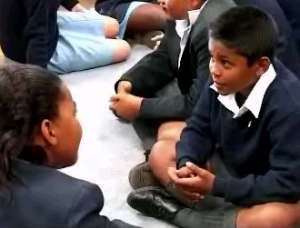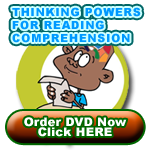Co-operative Learning
 Co-operative Learning is part of the important and significant changes occurring in education around the world today. It is a teaching approach that helps educators realise a new vision of quality education: one that develops self-directed, inquisitive learners, creative thinkers and caring and responsible human beings.
Co-operative Learning is part of the important and significant changes occurring in education around the world today. It is a teaching approach that helps educators realise a new vision of quality education: one that develops self-directed, inquisitive learners, creative thinkers and caring and responsible human beings.
Co-operative Learning can be viewed from a number of perspectives:
It can be
.. · a teaching strategy
.. · a technique for facilitating meetings
.. · an orientation toward how people relate
 MetaGroup Communications views Co-operative Learning as an orientation toward other people.
MetaGroup Communications views Co-operative Learning as an orientation toward other people.
We recognize its potential to bring out the best in people, be they your learners or work colleagues. CL is embedded in the belief that learning and communication are social processes. When we nurture and support the relationships between the people, we bring out the best in each person and the whole group.
The more traditional values of individualism and competition do not enable people to come together to meet today’s challenges. Co-operation does. As an orientation toward other people, Co-operative Learning promotes a culture of learning together. When we hold this view, people come together to aid each other’s success and mutual gain.
Whatever the challenge, it’s an opportunity to learn together. Whatever the situation, let’s connect through co-operation.
 The Co-operative Learning Wheel is a visual representation of the key concepts for designing and implementing Co-operative Learning successfully. The various rings and segments of the wheel show the interrelationships between the theory, principles and practices of CL. Formulated by Alyce Miller, this model builds upon the ideas of leading Co-operative Learning researchers: Roger & David Johnson and Spencer Kagan and Elizabeth Cohen.
The Co-operative Learning Wheel is a visual representation of the key concepts for designing and implementing Co-operative Learning successfully. The various rings and segments of the wheel show the interrelationships between the theory, principles and practices of CL. Formulated by Alyce Miller, this model builds upon the ideas of leading Co-operative Learning researchers: Roger & David Johnson and Spencer Kagan and Elizabeth Cohen.
Cohen, Elizabeth (1994). Designing Groupwork: Strategies for the Heterogeneous Classroom. The Teachers College Press: New York.
Johnson, D., R.T. Johson, E.J. Holubec (1990). Cooperation in the Classroom. Interaction Book Company: Edina, Minn.
Kagan, Spencer (1992). Cooperative Learning. Resources for Teachers, Inc.: San Juan Capistrano, Ca.
CLICK HERE to view CL Wheel visual with descriptions
CLICK HERE to view MetaGroup’s Co-operative Learning Lesson Sequence
CLICK HERE to view animation of why Co-operative Learning enables the brain to learn more and better
◊—–◊—–◊—–◊—–◊—–◊—–◊—–◊—–◊—–◊—–◊—–◊—–◊—–◊—–◊—–◊—–◊—– pg. top
In our latest Professional Development DVD, Thinking Powers for Reading Comprehension, we show WHY the brain benefits from Co-operative Learning on a biological level! In an animation of how the brain learns we see that for learning to take place, the learner needs to feel safe so that the right chemicals can be released; otherwise the ‘stress molecules’ block learning from taking place. Co-operative Learning enables educators to create optimal learning environments.
Latest Professional Development DVD: Thinking Powers for Reading Comprehension. See what OBE looks like in classrooms that use Co-operative Learning with Multiple Intelligences to teach key thinking strategies for reading, writing and learning.
*Getting Connected with Co-operative Learning: creating a learning community for literacy
Four complete, two hour lessons that guide educators in establishing co-operative learning practices while creating a learning community for literacy.
The learning programme you’ve been looking for! What to do the FIRST WEEK OF THE TERM to establish classroom routines and behaviours for co-operation, inclusion and good discipline.
 Getting Connected with Co-operative Learning guides educators in creating a learning community for literacy. It is a learning programme consisting of four comprehensive lessons that introduce learners to co-operative skills and classroom management routines. The lessons revolve around the theme of inclusion which is supported by literature and learning area texts appropriate for the age group. These lessons will enable you to directly teach social skills so that learners take turns, actively listen and paraphrase. They show you how to establish a sequence of activities that provide a balanced literacy programme.
Getting Connected with Co-operative Learning guides educators in creating a learning community for literacy. It is a learning programme consisting of four comprehensive lessons that introduce learners to co-operative skills and classroom management routines. The lessons revolve around the theme of inclusion which is supported by literature and learning area texts appropriate for the age group. These lessons will enable you to directly teach social skills so that learners take turns, actively listen and paraphrase. They show you how to establish a sequence of activities that provide a balanced literacy programme.
In this step-by-step guide discover how to:
- Enable learners to take turns, express their own ideas, pose questions, listen actively, paraphrase, and give direction to the group
- Create a positive learning environment so that learners feel safe and accepted, want to participate and have fun learning together
- Facilitate active learning for large groups of diverse learners with Co-operative Learning groupwork tasks
- Design daily lessons where learners practice all language area outcomes, including speaking and listening, decoding skills of phonics, spelling and vocabulary, reading comprehension strategies, thinking skills, writing, and grammar and language conventions.
- Raise learners awareness about their thinking processes (metacognition) so that they start connecting their lives and experiences to the stories being read, one of the key thinking strategies good readers use.
- Develop learners as a teaching resource for one another
This programme shows you how to pre-empt discipline problems by establishing learner’s sense of ownership for learning and what happens in the classroom. From day one, start developing learners’ language competences while establishing learning routines and habits of mind for self-empowered high performance teams and self-directed learners.
Click here for Professional Development Courses for Getting Connected with CL
Learning programme series: Getting Connected with Co-operative Learning
- Creating a learning community for literacy, Foundation Phase plus (Grades R- 4) currently being translated from English into Xhosa and Afrikaans.
Programmes currently being developed:
- Creating a learning community for literacy, Intermediate Phase plus (grades 4-7)
- Creating a learning community for literacy, Senior Phase and beyond (grades 7-12)
◊—–◊—–◊—–◊—–◊—–◊—–◊—–◊—–◊—–◊—–◊—–◊—–◊—–◊—–◊—–◊—–◊—– pg. top



